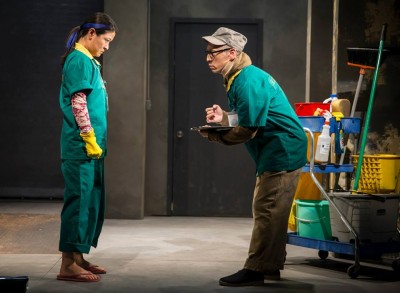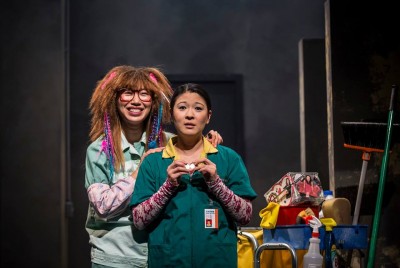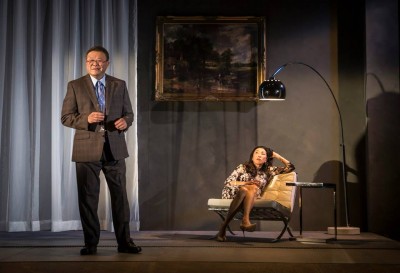The World of Extreme Happiness
Directed by Eric Ting
Goodman Theatre
It turns out China is a repressive country with poor labor conditions.
The first question I was taught to ask as a dramaturge was “why this play now?” For The World of Extreme Happiness, a production imported from the Manhattan Theatre Club, I don’t have a good answer for that.
The story opens in 1992, with peasant farmer and racing pigeon breeder Li Han (Donald Li) telling the story of how a pigeon shat in his mouth. After further establishing his earthiness with some talk of whores, he is interrupted by his wife (Joe Mei)’s profanity-laced tirade listing all the reasons why she would rather have a boy than a girl, while she gives birth to a girl. They are disappointed to find they have another daughter and dump her in the slop bucket to which they consigned the others, but she lives and grows up to be Sunny (Jennifer Lim).
Flash-forward to 2012, when Sunny works as a meek janitor in Shenzhen to support her widowed father and younger brother, Pete (Ruy Iskandar). After she calls him to list all the STDs that abound in the Chinese sex industry, her boss Old Lao (Francis Jue) enters to give more exposition about Chinese labor conditions. It seems one of the supervisors killed himself, and Sunny would like the position. She is declined, but her obnoxious friend Ming-Ming (also Mei) suggests that all she is missing is self-confidence. They go to a seminar on magical thinking, inspired by the example of Artemis (Jodi Long), the vice-president of their factory’s chief client. Meanwhile, Artemis complains to factory owner James Lin (Li again, in a role that exists only for Artemis to declaim to) that worker suicides hurt their image. Her solution is to film a “documentary” about how much the factory has improved the workers’ lives, show it in the Great Hall of the People, and bring in a peasant-girl to be their spokesperson.
 Back in the countryside, Pete dreams of studying traditional performance. Li would rather his son go into pigeon-racing, and he is interested in marrying Sunny to the neighbor’s dead son. Sunny arrives back at home brimming with new-found confidence, where she convinces Pete to join her in Shenzhen, where she also plans on auditioning to be the factory spokesperson. Artemis is abducted by police who are suspicious that she is planning counter-revolutionary activity, because apparently you can rent out China’s capitol without explaining what you are using it for. She convinces them her film will only be patriotic propaganda, but from there things get much worse for everyone.
Back in the countryside, Pete dreams of studying traditional performance. Li would rather his son go into pigeon-racing, and he is interested in marrying Sunny to the neighbor’s dead son. Sunny arrives back at home brimming with new-found confidence, where she convinces Pete to join her in Shenzhen, where she also plans on auditioning to be the factory spokesperson. Artemis is abducted by police who are suspicious that she is planning counter-revolutionary activity, because apparently you can rent out China’s capitol without explaining what you are using it for. She convinces them her film will only be patriotic propaganda, but from there things get much worse for everyone.
Dramatically, the second act has a lot more going on, so I won’t spoil it. But the first act is so slow, and has such clunky, exposition-laden dialogue, the play struggled to regain my interest. Eventually, Old Lao and Artemis each get a heart-felt monologue about the difficulty of living through China’s tumultuous Twentieth Century to be comforted with only material success, and they succeed in briefly tugging some heartstrings, but this is still telling instead of showing after we’ve already had list after list of social ills. Mimi Lien’s monochromatic grey set design relies on painted backdrops to indicate change in location, which is effective enough. Jenny Mannis designed an amusingly horrible suit for motivational speaker Mr. Destiny (Jue), taking advantage of one of the few characters who isn’t a peasant or worker. Eric Ting’s direction really drags the first act out, and the second act is only saved by the playwright having to finally introduce some danger.
 The main character is surprisingly underwritten for how much Cowhig wanted a strong female lead; I have a hard time describing Sunny other than saying she is a Ke$ha fan and bursts into action when the plot requires it. Lim does her best with what she has to work with. I vastly preferred Long in her other role, the mid-wife Wang Hua, in which she was vibrantly funny, and played well off of Iskandar. His and Jue’s physical comedy supplied my favorite moments of the show.
The main character is surprisingly underwritten for how much Cowhig wanted a strong female lead; I have a hard time describing Sunny other than saying she is a Ke$ha fan and bursts into action when the plot requires it. Lim does her best with what she has to work with. I vastly preferred Long in her other role, the mid-wife Wang Hua, in which she was vibrantly funny, and played well off of Iskandar. His and Jue’s physical comedy supplied my favorite moments of the show.
Ultimately, I don’t understand why this play exists. Anybody who goes to Manhattan Theatre Club or the Goodman already follows the news enough to know China is a developing country with a lot of problems. The sort of fleeting pity which oppression voyeurism inspires does nothing to help people on the other side of the world. What are we supposed to do? Boycott every business with ties to China? Bomb them? Experience catharsis? I saw about five Asian people in the audience. Cowhig spoke as if it were a good thing that the subject matter is of no personal relevance to most people watching. Certainly this play will never be show in the People’s Republic of China, the one place where it could make a difference. I do give Cowhig credit for calling out the negative consequences of believing in karma-driven reincarnation, but that idea needed more exploration, especially given how important it is to the play’s end. I felt that there were ideas for a story here, but they got lost amid lack of focus, a glacial pace, and the hackneyed device of an unexpected public speech (apparently broadcasts from the Great Hall of the People aren’t on a tape delay, either).
Somewhat Recommended
Jacob Davis
Reviewed September 26, 2014
Playing in the Owen Theatre at the Goodman, 170 North Dearborn St, Chicago, IL, 60601
Box Office: 312-443-3800
Tickets: $10-40,
Time: 2hrs, 15 min, with intermission
Runs Sept 13- Oct 12 Tues-Weds at 7:30 pm, Fri and Sat at 8 pm, Sat and Sun at 2pm


